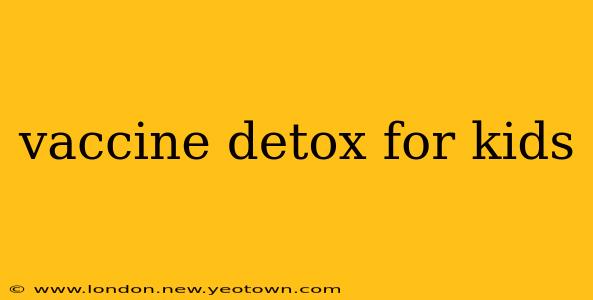The Myth of Vaccine Detox for Kids: Understanding Immunity and Safety
The idea of a "vaccine detox" for children is a dangerous misconception circulating online. There's no scientific basis for such a procedure, and promoting it can have serious consequences for children's health and well-being. This article aims to dispel the myths surrounding vaccine detox and explain the crucial role vaccines play in protecting children from preventable diseases.
Let's begin our journey by understanding the fundamental principles of how vaccines work and why they are essential for a child's health.
What are vaccines and how do they work?
Vaccines are like tiny, harmless versions of a germ (virus or bacteria). They teach your child's immune system – their body's defense system – to recognize and fight off the real germ if they ever encounter it. Think of it as a training exercise for the body's army. The vaccine introduces a weakened or inactive part of the germ, prompting the immune system to produce antibodies, specialized proteins that fight off infections. This process creates a "memory" within the immune system, meaning if the child is exposed to the real germ later, their body is ready to swiftly neutralize the threat before it causes illness.
This process is completely natural and is how our bodies are designed to work. Vaccines simply give our immune system a head start in battling potentially dangerous pathogens.
Are vaccines safe for children?
Yes, vaccines are incredibly safe. Rigorous testing and monitoring ensure that vaccines are thoroughly evaluated for safety and effectiveness before being made available. Side effects are typically mild and temporary, such as a sore arm or a slight fever. Serious side effects are extremely rare. The benefits of vaccination far outweigh any potential risks. The numerous preventable diseases vaccines protect against cause far greater harm than any potential side effects from vaccination.
What are the common misconceptions about vaccines?
One of the most pervasive misconceptions is the belief that vaccines overload the immune system. However, the human immune system is far more robust and capable than most people realize. It encounters numerous pathogens and antigens daily, and vaccination poses only a minimal additional load. This load is significantly less than the exposure children might face in the absence of vaccination.
Another common myth is that vaccines cause autism. This has been extensively researched and debunked by numerous scientific studies. There is no credible evidence to support this claim.
What are the consequences of not vaccinating children?
Not vaccinating children leaves them vulnerable to a host of serious and sometimes deadly diseases like measles, mumps, rubella, polio, whooping cough, and more. These diseases can cause lifelong disabilities or even death, especially in young children and those with weakened immune systems. Furthermore, unvaccinated individuals can spread these diseases to others, particularly those who can't be vaccinated due to medical reasons. This is known as herd immunity, where a high vaccination rate protects even those who cannot be vaccinated.
Is there such a thing as a "vaccine detox"?
No, there is no scientific basis for a "vaccine detox." The body's own natural processes effectively handle the components of vaccines. Claims suggesting otherwise are often based on misinformation and lack credible scientific evidence. Any product or practice marketed as a "vaccine detox" should be viewed with extreme skepticism.
What should parents do if they have concerns about vaccines?
If you have any concerns or questions about vaccines, it's crucial to speak with your child's pediatrician or another qualified healthcare professional. They can provide accurate information based on scientific evidence and address your specific concerns. Relying on unreliable sources of information can be dangerous and potentially harm your child's health.
In conclusion, the concept of a "vaccine detox" is a harmful myth. Vaccines are a safe and effective way to protect children from preventable diseases, and the benefits far outweigh any perceived risks. Always consult your pediatrician or healthcare professional for accurate information about vaccines and your child's health. Protecting children through vaccination is an act of love and responsibility.

